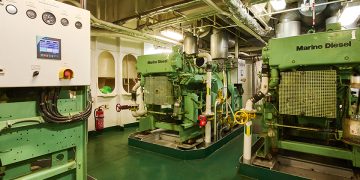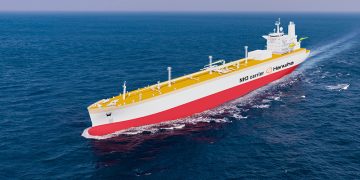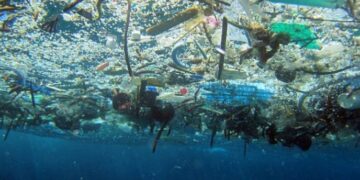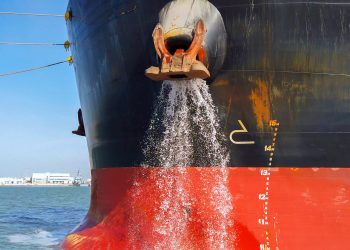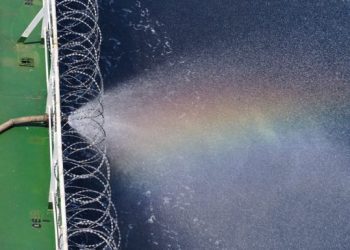In collaboration with CWA International, the Swedish Club produced a practical guide to help operators with the hold cleaning of bulk vessels.
According to the guide, the preparation and cleaning of a vessel’s cargo holds for the next intended cargo is a vital part of bulk carrier operations. Hold cleaning requires clear planning, preparation and efficient execution.
Failure to carry out the proper hold preparation prior to loading can lead to cargo claims relating to cargo contamination, overflowing bilges, as well as contractual claims relating to delay, failed surveys, loss of hire and further charterparty disputes
Required cleanliness standard
When determining the level of hold cleaning required for the next cargo, the requirements stated in the International Maritime Solid Bulk Cargoes (IMSBC) Code under hold cleanliness for the type of cargo to be loaded must be considered.
Many cargoes specify ‘no special requirements’ or ‘clean and dry as relevant to the hazards of the cargo’ but some cargoes have specific instructions.
An example of which is Sulphur UN 1350 where the code states that holds should be ‘clean and dry as relevant to the hazards of the cargo and should be thoroughly clean and washed with fresh water’.
Preparations for cleaning of the cargo holds will begin immediately on completion of discharge of the previous cargo regardless of whether the next cargo is fixed or not.
It is essential that the complete chain of command from the chartering and technical management teams ashore to the Master and crew of the vessel understand what is required and that the tools, materials and manpower is available to achieve the correct level of cleaning.
What is acceptable for one cargo such as sweeping and water washing may not be acceptable for another cargo and it is vital that all parties are aware of the specific requirements.
Clear terms should be set out in the voyage instructions to accurately define the cargo to be carried, the cleanliness standards required, post carriage cleaning requirements, any issues with compliance with international regulations such as MARPOL and the responsibilities of the Master/ crew.
A copy of the charterparty should always be provided to the vessel for reference.
Grades of cleanliness
#1 Hospital clean: All cargo residues, loose scale, paint must be removed, the holds washed, dried and ventilated. In addition, all surfaces inclusive of ladders, pipework, the underside of hatch covers, tank tops etc. must have intact paint coatings. This type of cleanliness requirement would be most commonly used for high grade cargoes, materials for final use or goods for direct human consumption.
#2 Grain clean: Grain clean is the most common standard required. If the next cargo has not been fixed on completion of discharge it is the default standard to which most vessels will clean the holds whilst awaiting instructions. A vessel will be required to be grain clean to load most bulk cargoes such as all grain cargoes, cement, sulphur, alumina and fertilisers.
#3 Normal clean: When no specific instructions are contained within the charterparty then residues should be removed, the holds double swept, salt water washed, fresh water rinsed and dried. This standard of cleaning is commonly used when loading similar or compatible cargoes to the previous cargo carried. It would be the typical level of cleaning for coal, bauxite, salt, iron ore etc.
#4 Swept clean or shovel clean: The swept clean or shovel clean standard means that all previous cargo residues are removed by an excavator or a rough sweep and cleaned by shovel. The exact requirements must be clarified by the Master before carrying out the cleaning operation.
#5 Load on top: Whilst load on top requires no specific cleaning of the holds it is advisable to consider that the cargo residues will prevent a thorough inspection of the hold structure for any damages. If load on top is continued for a period of several cargoes, then the subsequent cleaning to any higher standard of cleanliness will take much longer. Therefore, it is advisable that if time allows that the holds are cleaned periodically or at the very least residues are cleared away to one side to allow inspections of the hold structure.
Other requirements
It is important to note that the IMSBC Code also details specific requirements for the clean up after discharge. For many cargoes the entry is ‘no special requirements’ but some cargoes such as Sulphur UN 1350 have detailed instructions as follows, such as:
The cargo spaces and other structures which may have been in contact with this cargo or the dust shall not be swept. After discharge of this cargo, the cargo spaces, and other structures as necessary, shall be washed out with fresh water to remove all residues of this cargo. Then the cargo spaces shall be thoroughly dried. Wet dust or residues may form highly corrosive sulphurous acid, which is extremely dangerous to personnel and corrosive to steel. Persons involved in cleaning up shall be provided with protective clothing, goggles and facemasks to wear
Lessons learned
- Ensure the name and type of the intended cargo are known before loading.
- Seek guidance on cleaning requirements for that cargo before loading.
- It is recommended that a minimum level of hold cleanliness is maintained to allow inspections of the holds for damage and to minimise cleaning time from one cleanliness grade to another or from one type of cargo to another.
- Vessels should comply with MARPOL Annex V concerning the discharge of cargo residues and washing water overboard.







